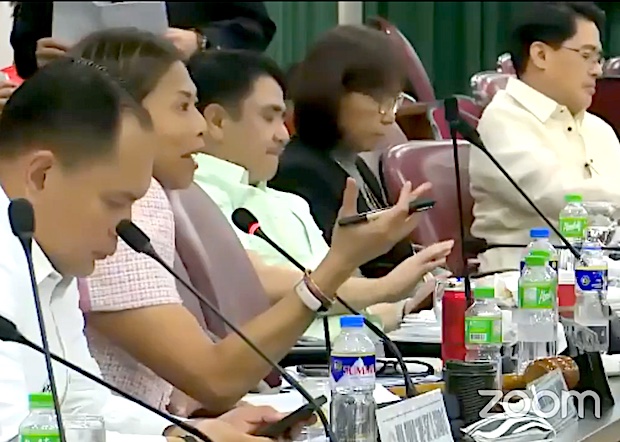
Marikina Rep. Stella Quimbo (second from left), vice chair of the Committee on Appropriations, at the hearing on Tuesday, Feb. 28, 2023. (Photo from a video on the Facebook page of the House of Representatives)
MANILA, Philippines — Should the Department of Agriculture — headed by President Ferdinand Marcos Jr. — be given additional powers to ensure the stability of food prices?
Marikina 2nd District Rep. Stella Quimbo posed this question on Tuesday at the hearing of the House Committee on Appropriations on Tuesday, where members of the Development Budget Coordination Committee (DBCC) were invited.
Quimbo, the vice chairperson of the committee, said that hearings in the House had revealed that bringing down prices of food products would not be easy — which was why she asked that question
“Yesterday, the Committee on Agriculture, chaired by Cong Mark Enverga, had a third marathon hearing on onion prices. So this is the only clear thing: The solution is not easy,” Quimbo said in a mix of English and Filipino.
“There are more nuanced questions such as: Should Congress insist on the reconvening of the inter-agency unit on economic intelligence to intensify enforcement against agriculture cartels which have been engaged in hoarding and price manipulation? Should Congress grant the Department of Agriculture or the president additional powers to enforce food price stabilization measures? If so, what are these?” she added.
P9 billion in social aid
To ensure that low-income families would be aided, the economic managers said that P9 billion in social aid would be allocated to nine million families — which will come in the form of a P1,000 assistance for two months.
Social aid would be important to families struggling to make ends meet, especially as the economic team admitted that inflation — or the increase in the prices of goods and the weakening of purchasing power — is expected to taper off between the second quarter of 2023 or the end of the year.
Last Feb. 7, the Philippine Statistics Authority said that the headline inflation rate for January 2023 was at 8.7% — higher than the 8.1% recorded in December 2022.
This was the fastest inflation since a 9.1% headline rate in November 2008.
“Despite the economy’s relatively sound macroeconomic fundamentals, persistently high inflation has been a major concern for the Philippine authorities, as with other countries,” Finance Secretary Benjamin Diokno admitted.
“In recent months, the country’s inflation levels have continued to accelerate due to food supply constraints and higher utility rates. In January this year, inflation was recorded at 8.7 percent, higher than the 8.1 percent in December last year. This exceeds the inflation forecast of the BSP at 7.5 to 8.3 percent and the median estimate of private sector economists at 7.6 percent,” he added.
Monitoring markets
Diokno also mentioned that more effort would be placed on monitoring markets and the ground, to ensure that vulnerable sectors would be protected “from the effects of higher costs of goods and services.”
The Kadiwa program, where products are sold at a lower price by eliminating several costly processes between growers and sellers, would be expanded.
“Ground monitoring will entail further enhancing our early warning systems and situation analysis to ensure timely and immediate intervention from the government,” Diokno said.
“To protect the vulnerable sectors, we will expand and improve the Kadiwa Program and ensure that the most vulnerable segments of the population are protected against these shocks through targeted — let me repeat that, targeted subsidies. Yet, we must ensure that these measures do not add up further to demand-side inflationary pressures,” he added.
This is not the first time that the possibility of giving Marcos additional powers was raised. Last July 2022, Albay 2nd District Rep. Joey Salceda — an economist by profession — proposed giving the president special powers to counter the inflationary effects.
The proposal would have given Marcos anti-hoarding powers, the ability to incentivize production, provide loans for suppliers of essential goods, and powers to investigate possible market abuse, among others.
During that time, in June 2022, the headline inflation rate was at just 6.1%.